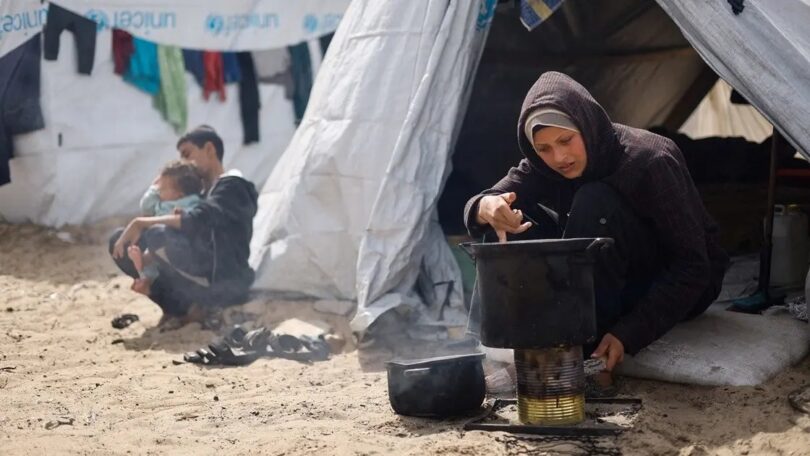GAZA : The Palestinian death toll in Israel’s war on Gaza has climbed to 31,045 while humanitarian aid efforts gathered pace ahead of Ramadan.
The enclave’s Health Ministry confirmed the death toll Sunday, adding that another 72,654 people have been left wounded since Oct. 7 in Israel’s military offensive on the Gaza Strip.
Earlier Saturday, the ministry reported that at least 82 Palestinians had been killed and 122 others injured in just 24 hours.
“The Israeli occupation committed 10 massacres against families in the Gaza Strip, leaving 82 martyrs and 122 injured during the past 24 hours,” the ministry said in a statement.
“Many people are still trapped under rubble and on the roads as rescuers are unable to reach them,” the statement said.
“72% of victims of the Israeli aggression on Gaza are children and women,” it added.
Aid efforts
In apparent mobilization to provide a starving Gaza with desperately needed aid, a U.S. has dispatched a military aid ship, the Central Command (CENTCOM) said Sunday.
The announcement comes days after President Joe Biden vowed to build a temporary pier to supply the besieged enclave.
The Gen. Frank S. Besson left Joint Base Langley-Eustis in Virginia “less than 36 hours after President Biden announced the U.S. would provide humanitarian assistance to Gaza by sea,” CENTCOM said in a statement.
The logistics support vessel is “carrying the first equipment to establish a temporary pier to deliver vital humanitarian supplies,” it said.
Biden’s announcement in his State of the Union address on Thursday followed U.N. warnings of widespread famine among Gaza’s 2.3 million Palestinians five months after Israel launched its war.
Gaza has no port infrastructure. The U.S. initially plans to use Cyprus, which is offering a process for screening cargoes that will include Israeli officials, removing the need for security checks in Gaza.
Most of Gaza’s people are now internally displaced, with severe bottlenecks in aid deliveries at land border checkpoints.
Gaza has been under an Israeli navy blockade since 2007, when Hamas took control of the enclave. There have been few direct sea arrivals since then.
Meanwhile, a Spanish nongovernmental organization has said its boat, laden with food for Gazans, was “ready” to set sail from Cyprus.
It looks to use the proposed sea route that aims to counter aid access restrictions, which humanitarians and foreign governments have blamed on Israel.
Spanish charity Open Arms said its boat, which docked three weeks ago in Cyprus’s Larnaca port, was “ready” to embark but awaits final authorization.
It would be the first shipment along a maritime corridor from Cyprus – the closest European Union country to Gaza – that the EU Commission hopes will open Sunday.
Open Arms spokeswoman Laura Lanuza told AFP that Israeli authorities were inspecting the cargo of “200 tonnes of basic foodstuffs, rice and flour, cans of tuna.”
U.S. charity World Central Kitchen, which has partnered with Open Arms, has teams in the besieged Gaza Strip who were “constructing a dock” to unload the shipment, Lanuza said.
The U.N.’s World Food Programme has also warned that the volume of aid that can be delivered by sea will do little if anything to stave off famine in Gaza.
Humanitarian workers and U.N. officials say easing the entry of trucks to Gaza would be more effective than aid airdrops or maritime shipments.
The U.S. military said it airdropped more than 41,000 meals into Gaza on Saturday, and Canada has said it too will join aerial aid delivery missions.
But a steady flow of relief into Gaza was “only part of the solution,” said International Committee of the Red Cross chief Mirjana Spoljaric.
The warring sides must do more to “safeguard civilian life and human dignity,” she said, decrying the “unacceptable” civilian death toll.
The U.N. has repeatedly warned of looming famine, particularly in north Gaza where no overland border crossings are open.
In Rafah, in Gaza’s far south, “we can barely get water,” said displaced Palestinian woman Nasreen Abu Yussef.
Roughly 1.5 million Palestinians have sought refuge in the city, where Atallah al-Satel said he wanted an end to the war.
“We are just exhausted citizens,” said Satel, who had fled to Rafah from Khan Younis.
‘Tough’ truce talks
However, hopes were fading fast for a pause in the fighting before Ramadan amid ongoing Israeli attacks and the Israel-Hamas blame game for trying to derail negotiations.
U.S. President Joe Biden said Israeli leader Benjamin Netanyahu’s approach to the war was “hurting Israel more than helping Israel,” during an interview with MSNBC broadcast Saturday.
Netanyahu “has a right to defend Israel, a right to continue to pursue Hamas,” Biden said, but added that “he must pay more attention to the innocent lives being lost as a consequence of the actions taken.”
Israel’s brutal war on Gaza began after the Oct. 7 Hamas incursion that resulted in about 1,160 deaths, according to Israeli official figures.
The Israeli army said another of its soldiers had died in Gaza, taking its overall losses to 248 since the start of ground operations.
Palestinian resistance groups also took about 250 people hostages, some of whom were released during a weeklong truce in November. Israel believes 99 hostages remain alive in Gaza and that 31 have died.
After a week of talks with mediators in Cairo failed to produce a breakthrough, Hamas’s armed wing said it would not agree to a hostage-prisoner exchange unless Israeli forces withdraw. Israel has rejected such a demand.
On Saturday, Netanyahu’s office said Mossad spy agency chief David Barnea had met CIA director William Burns on Friday “as part of the ceaseless efforts to advance another hostage release deal.”
Biden has acknowledged it would now be “tough” to secure a new truce deal in time for Ramadan.
Saturday’s Israeli statement accused Hamas of “entrenching its positions like someone who is not interested in a deal and is striving to inflame the region during Ramadan”.
Israeli military spokesman Daniel Hagari said Israel was preparing for “all possible operational scenarios” during the Muslim holy month.
On the ground in southern Gaza, the Israeli army said fighting persisted in the area of Khan Yunis. Hamas authorities reported Saturday more than 30 air strikes overnight.
Hamas chief Ismail Haniyeh called for the speedy distribution of aid to Gazans and for the full opening of border crossings “to end the siege of our people”.
The war’s effects have been felt across the region, including off Yemen, where the US military said it and allied forces shot down 28 one-way attack drones fired by Iran-backed Houthi rebels towards the Red Sea and Gulf of Aden on Saturday.
Courtesy: Dailysabah







